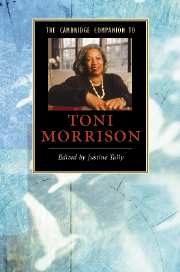Book contents
- Frontmatter
- Introduction: “All necks are on the line”
- Part I Toni Morrison’s fiction
- 1 The Bluest Eye and Sula: black female experience from childhood to womanhood
- 2 Song of Solomon and Tar Baby: the subversive role of language and the carnivalesque
- 3 Beloved or the shifting shapes of memory
- 4 Jazz and Paradise: pivotal moments in black history
- 5 The Morrison trilogy
- 6 Love and the survival of the black community
- 7 The artistic impulse of Toni Morrison’s shorter works
- Part II Toni Morrison’s criticism and editing
- Part III Essays
- Part IV Further Reading
- Index
7 - The artistic impulse of Toni Morrison’s shorter works
from Part I - Toni Morrison’s fiction
Published online by Cambridge University Press: 28 January 2008
- Frontmatter
- Introduction: “All necks are on the line”
- Part I Toni Morrison’s fiction
- 1 The Bluest Eye and Sula: black female experience from childhood to womanhood
- 2 Song of Solomon and Tar Baby: the subversive role of language and the carnivalesque
- 3 Beloved or the shifting shapes of memory
- 4 Jazz and Paradise: pivotal moments in black history
- 5 The Morrison trilogy
- 6 Love and the survival of the black community
- 7 The artistic impulse of Toni Morrison’s shorter works
- Part II Toni Morrison’s criticism and editing
- Part III Essays
- Part IV Further Reading
- Index
Summary
Toni Morrison is best known for her extraordinary novels and her influential essays. However, though less well known, her “shorter pieces” are as remarkable as those, for they share that clear, visionary insight into the fate of Africans in the New World which is the guiding concern of all her work, whether as an editor, a writer, or a teacher. Her abiding artistic impulse is, in the words of one of her own songs, to “cut through the dark and get to the heart” of the complex issues at stake. To date Morrison has produced four of these “shorter works”: the unpublished songs and the story for District Storyville, a 1982 musical set in that district of New Orleans, choreographed by Donald McKayle and based on his 1962 dance of the same name; “Recitatif,” a short story published in 1983 in Confirmation: An Anthology of African American Women, edited by Amiri and Amina Baraka; a play, Dreaming Emmett, written for and produced by the Albany Repertory Theater in celebration of Dr. Martin Luther King's birthday in January 1986; and the libretto for the opera, Margaret Garner, music by Richard Danielpour, commissioned and produced by the Detroit, Cincinnati, and Philadelphia Opera Houses which premiered at the Detroit Opera in May 2005.
Three of these four pieces are, at the time of writing, unpublished for different reasons, and have received little critical attention. Thus, as indicated, my accounts of them are based primarily on a series of conversations with individuals involved in these collaborations; my sincere thanks to them all, in particular Ms. Morrison.
- Type
- Chapter
- Information
- The Cambridge Companion to Toni Morrison , pp. 101 - 112Publisher: Cambridge University PressPrint publication year: 2007

